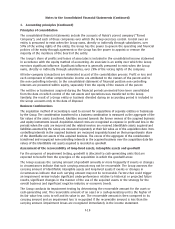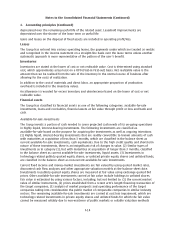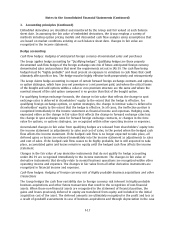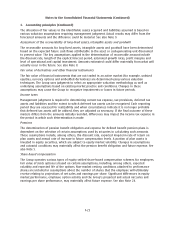Nokia 2010 Annual Report Download - page 207
Download and view the complete annual report
Please find page 207 of the 2010 Nokia annual report below. You can navigate through the pages in the report by either clicking on the pages listed below, or by using the keyword search tool below to find specific information within the annual report.1. Accounting principles (Continued)
within financial income and expenses. For qualifying foreign exchange options, the change in intrinsic
value is deferred in shareholders’ equity. Changes in the time value are at all times recognized
directly in the income statement as financial income and expenses. If a foreign currency denominated
loan is used as a hedge, all foreign exchange gains and losses arising from the transaction are
recognized in shareholders’ equity. In all cases, the ineffective portion is recognized immediately in
the income statement as financial income and expenses.
Accumulated changes in fair value from qualifying hedges are released from shareholders’ equity into
the income statement only if the legal entity in the given country is sold, liquidated, repays its share
capital or is abandoned.
Income taxes
The tax expense comprises current tax and deferred tax. Current taxes are based on the results of the Group
companies and are calculated according to local tax rules. Taxes are recognized in the income statement,
except to the extent that it relates to items recognized in the other comprehensive income or directly in
equity, in which case, the tax is recognized in other comprehensive income or equity, respectively.
Deferred tax assets and liabilities are determined, using the liability method, for all temporary
differences arising between the tax bases of assets and liabilities and their carrying amounts in the
consolidated financial statements. Deferred tax assets are recognized to the extent that it is probable
that future taxable profit will be available against which the unused tax losses or deductible
temporary differences can be utilized. Each reporting period they are assessed for realizability and
when circumstances indicate it is no longer probable that deferred tax assets will be utilized, they are
adjusted as necessary. Deferred tax liabilities are recognized for temporary differences that arise
between the fair value and tax base of identifiable net assets acquired in business combinations.
Deferred tax assets and deferred tax liabilities are offset for presentation purposes when there is a
legally enforceable right to set off current tax assets against current tax liabilities, and the deferred
tax assets and the deferred tax liabilities relate to income taxes levied by the same taxation authority
on either the same taxable entity or different taxable entities, which intend either to settle current
tax liabilities and assets on a net basis, or to realize the assets and settle the liabilities
simultaneously, in each future period in which significant amounts of deferred tax liabilities or assets
are expected to be settled or recovered.
The enacted or substantially enacted tax rates as of each balance sheet date that are expected to
apply in the period when the asset is realized or the liability is settled are used in the measurement
of deferred tax assets and liabilities.
Provisions
Provisions are recognized when the Group has a present legal or constructive obligation as a result of
past events, it is probable that an outflow of resources will be required to settle the obligation and a
reliable estimate of the amount can be made. Where the Group expects a provision to be reimbursed,
the reimbursement is recognized as an asset only when the reimbursement is virtually certain. At
each balance sheet date, the Group assesses the adequacy of its preexisting provisions and adjusts
the amounts as necessary based on actual experience and changes in future estimates.
Warranty provisions
The Group provides for the estimated liability to repair or replace products under warranty at the
time revenue is recognized. The provision is an estimate calculated based on historical experience of
the level of volumes, product mix and repair and replacement cost.
F19
Notes to the Consolidated Financial Statements (Continued)
























